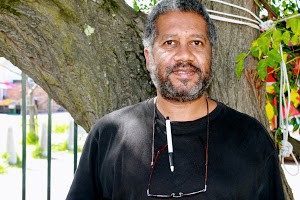- About
- Topics
- Picks
- Audio
- Story
- In-Depth
- Opinion
- News
- Donate
- Signup for our newsletterOur Editors' Best Picks.Send
Read, Debate: Engage.
| November 09, 2023 | |
|---|---|
| topic: | Energy |
| tags: | #South Africa, #coal, #renewable energy, #corruption, #fishing |
| located: | South Africa |
| by: | Cyril Zenda |
South African environmentalists and rights advocates are stalling moves by the government to award a lengthy emergency power supply contract to a local subsidiary of a Turkish gas-to-electricity firm, citing grave environmental and economic concerns.
At a time when South Africa is expected to honor its climate commitments and rapidly shift away from fossil fuels, Pretoria is currently negotiating a 20-year power supply agreement with Karpowership South Africa, a local subsidiary of the Turkish power generation company Karpowership. However, since 2021, when Karpowership SA was selected as the preferred bidder to provide the majority of the 2,000 megawatts (MW) in emergency electricity, environmentalists have been actively opposing the deal.
South Africa is grappling with significant electricity shortages, leading to widespread daily power cuts of up to 10 hours in various regions of the country.
According to the Ministry of Mineral Resources and Energy, South Africa’s total domestic electricity generation capacity from all sources is 58,095 megawatts (MW). Coal constitutes the largest energy source for South Africa currently, comprising around 80 per cent of the country’s energy mix. However, since some of the country’s coal power stations are old and in a state of disrepair, actual power generation is substantially lower, resulting in a shortfall of between 4000 - 6000 MW.
This has led to the current crippling power cuts, known locally as 'load shedding.' It is a significant crisis that bears political, social and economic implications.
In response to this crisis, President Cyril Ramaphosa's government is pursuing a 200 billion rand (USD 10.5 billion) tender to Karpowership SA, aiming to secure emergency power for the next two decades. Karpowership plans to generate electricity from gas on its anchored ships stationed at three South African ports: Ngqura (Coega) in the Eastern Cape province, Richards Bay (KwaZulu-Natal province), and Saldanha (Western Cape province).
Detractors say the firm’s applications for environmental clearance for its controversial gas-to-electricity plants failed to meet the minimum requirements for public participation under South Africa’s environmental legislation.
They also argue that the firm’s environmental consultants did not conduct adequate studies on the effect of underwater noise created by its floating gas-fired plants. This, they argue, could harm marine life, including African penguins, endangered dolphins, whales and turtles and imperil small-scale fishers.
The tussle has reached the courts, where environmental groups are trying to halt the deal while the company and government are trying to force it through.
Liziwe McDaid, the strategic lead at The Green Connection, a South Africa-based environmental organisation that has spearheaded most of the lawsuits against the Karpowership deal, said civil society organisations have raised concerns regarding environmental impacts on the ocean and on fisherfolks' livelihoods.
"Our demands are that Karpower must follow all the proper processes, which have been put in place to assess whether it is indeed the best emergency electricity generation solution or not," McDaid told FairPlanet.
"We believe that Karpower is not part of any solution to deal with the power shortage," she added. "South Africa should not be buying electricity for 20 years for a crisis that should not last any longer than two (at most). There are now many more affordable sustainable solutions available, such as land-based renewable power plants."
The more than a dozen environmental groups argue that not only is Karpowership's tactic out-dated and detrimental to the environment, but would also put the cost of power out of reach for the country's poor majority.
"Civil society organisations like The Green Connection have gone to court because Karpower refused to release information that would explain the electricity price the people of South Africa would pay," McDaid said. "This information is critical, and will help government decide whether or not to pursue this technology, especially when we consider what’s been happening in Sierra Leone and Guinea-Bissau, where Karpowership has cut power due to non-payment of electricity bills."
She added, "Here we see first-hand what this type of power could mean for our country. Add to that the pervasive corruption and weak governance; is this really a risk South Africans are willing to take?"
In a statement to FairPlanet, Naseegh Jaffer, director of Masifundise Development Trust, which supports small-scale fishing communities, said the project would have major impacts on coastal communities in these provinces.
"Small-scale fishers and fishing communities depend on marine resources for food and income, the impact of the Karpowerships will put their livelihoods and traditional ways of life at risk," Jaffer said.
"Fishing communities have continuously expressed their concerns about the project’s negative impact on marine resources and the livelihood of small-scale fishers, including water heating, underwater noise, depleting fish stocks and the risk of ocean blasts and leaks."
Camelita Mostert, a fisherwoman with Coastal Links Saldanha Bay, told FairPlanet that they have a customary right to make a living and feed their families from a clean and healthy ocean and, as such, they have a natural responsibility to protect it.
"All the fishing communities here have been speaking with one voice that we don’t want the Karpower ships near our oceans because fishing is our only source of livelihood," Mostert said. "We live out of the ocean. We are fishers, and we will die fishing, so we will protect our oceans for as long as we can."
She added that they have been writing letters to the department of Forestry, Fisheries and the Environment, protesting against the granting of environmental authorisation to the Karpowership project.
In a statement, South Africa's primary opposition party, the Democratic Alliance (DA), accused the ruling African National Congress (ANC) government of attempting to exploit the emergency power deal as a means to plunder public resources.
"The ANC government appears to have made up its mind to use the electricity crisis as an excuse to impose an outrageously expensive 20 year Karpowerships contract on the South African people," the DA protested.
"Any power contract that spans two decades cannot be classified under emergency procurement but is rather a scam to rip off billions of rands from South Africans, regardless of whether the Karpowerships are still needed or not."
The environmentalists opposing the deal have expressed bewilderment over the government's reluctance to seize the opportunity presented by the power crisis and invest in green energy initiatives like solar and wind. These renewable alternatives not only offer environmental benefits, they argue, but are also economically advantageous, promising long-term advantages for the country.
GroundWork, a non-profit environmental justice and development organisation based in South Africa, maintains that, from both an energy security and socioeconomic standpoint, the Karpowership project is unnecessary and unwanted.
"Its anticipated harms - for climate, biodiversity and socioeconomic considerations - far outweigh any alleged benefits, particularly in light of the feasibility of less harmful alternatives to meet the country’s electricity needs," said groundWork’s Avena Jacklin in opposition to the company’s application for environmental authorisation.
"The reliance on fossil fuels is hindering the country’s transition to renewable energy," Jaffer from Masifundise Development Trust added. "Considering the current climate crisis, we urge the government to prioritise the transition to renewable energy sources."
The outcome of the ongoing legal dispute is poised to serve as a litmus test for President Ramaphosa's government, gauging its dedication not only to addressing the energy crisis but also to fulfilling its commitment to accelerate the reduction of greenhouse gas emissions. This commitment aligns with the government's overarching goal of transitioning South Africa towards a low-carbon, resilient economy and society by the year 2050.
Image by American Public Power Association.
By copying the embed code below, you agree to adhere to our republishing guidelines.



